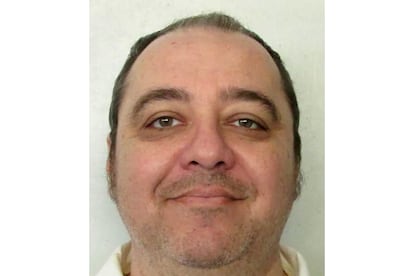Federal judge says Alabama can carry out nation’s first execution using nitrogen gas
Inmate Kenneth Eugene Smith’s attorneys said the method is cruel and experimental and are expected to appeal the decision

Alabama will be allowed to put an inmate to death with nitrogen gas later this month, a federal judge ruled Wednesday, clearing the way for what would be the nation’s first execution under a new method the inmate’s lawyers criticize as cruel and experimental.
U.S. District Judge R. Austin Huffaker rejected Alabama inmate Kenneth Eugene Smith’s request for an injunction to stop his scheduled Jan. 25 execution by nitrogen hypoxia. Smith’s attorneys have said the state is trying to make him the “test subject” for an untried execution method, and are expected to appeal the decision.
The question of whether the execution by nitrogen gas can ultimately proceed could end up before the U.S. Supreme Court.
The state’s plans call for placing a respirator-type face mask over Smith’s nose and mouth to replace breathable air with nitrogen, causing him to die from lack of oxygen. Three states — Alabama, Mississippi and Oklahoma — have authorized nitrogen hypoxia as an execution method, but no state has attempted to use it so far.
Smith, now 58, was one of two men convicted of the murder-for-hire slaying of a preacher’s wife in 1988 that rocked a small north Alabama community. Prosecutors said Smith and the other man were each paid $1,000 to kill Elizabeth Sennett on behalf of her husband, who was deeply in debt and wanted to collect on insurance.
Smith survived the state’s prior attempt to execute him. The Alabama Department of Corrections tried to give Smith a lethal injection in 2022 but called it off when authorities could not connect the two intravenous lines required to execute him.
The judge’s ruling letting the nitrogen execution plan go forward came after a court hearing in December and legal filings in which attorneys for Smith and Alabama gave diverging descriptions of the risks and humaneness of death from exposure to nitrogen gas.
Alabama Attorney General Steve Marshall’s office had argued in court filings that the deprivation of oxygen will “cause unconsciousness within seconds, and cause death within minutes.” The state compared the new execution method to industrial accidents in which people passed out and died after exposure to nitrogen gas.
But attorneys for Smith had argued that the new execution protocol is riddled with unknowns and potential problems that violate the constitutional ban on cruel and unusual punishment.
Smith’s attorneys noted in court filings that the American Veterinary Medical Association wrote in 2020 euthanasia guidelines that nitrogen hypoxia is an acceptable method of euthanasia for pigs but not for other mammals because it could create an “anoxic environment that is distressing for some species.”
Smith’s attorneys also argued the gas mask, which is fitted over his nose and mouth, would interfere with Smith’s ability to pray aloud or make a final statement before witnesses in his final moments. The Alabama attorney general’s office argued that Smith’s concerns are speculative.
The Alabama prison system agreed to minor changes to settle concerns that Smith’s spiritual adviser would be unable to minister to him before the execution. The state wrote that the spiritual adviser would be able to enter the execution chamber before the mask was placed on Smith’s face to pray with him and anoint him with oil. The Rev. Jeff Hood last month withdrew a lawsuit against the department.
The case that led to the death penalty for Smith shocked north Alabama at the time. The murder victim Sennett was found dead on March 18, 1988, in the home she shared with her husband in Alabama’s Colbert County. The coroner testified that the 45-year-old woman had been stabbed eight times in the chest and once on each side of the neck. Her husband, Charles Sennett Sr., then the pastor of the Westside Church of Christ, killed himself when the murder investigation focused on him as a suspect, according to court documents.
Smith’s initial 1989 conviction was overturned on appeal. He was retried and convicted again in 1996. The jury recommended a life sentence by a vote of 11-1, but a judge overrode the recommendation and sentenced Smith to death. Alabama no longer allows a judge to override a jury’s decision on death penalty decisions.
John Forrest Parker, the other man convicted in the slaying, was executed in 2010.
Sign up for our weekly newsletter to get more English-language news coverage from EL PAÍS USA Edition
Tu suscripción se está usando en otro dispositivo
¿Quieres añadir otro usuario a tu suscripción?
Si continúas leyendo en este dispositivo, no se podrá leer en el otro.
FlechaTu suscripción se está usando en otro dispositivo y solo puedes acceder a EL PAÍS desde un dispositivo a la vez.
Si quieres compartir tu cuenta, cambia tu suscripción a la modalidad Premium, así podrás añadir otro usuario. Cada uno accederá con su propia cuenta de email, lo que os permitirá personalizar vuestra experiencia en EL PAÍS.
¿Tienes una suscripción de empresa? Accede aquí para contratar más cuentas.
En el caso de no saber quién está usando tu cuenta, te recomendamos cambiar tu contraseña aquí.
Si decides continuar compartiendo tu cuenta, este mensaje se mostrará en tu dispositivo y en el de la otra persona que está usando tu cuenta de forma indefinida, afectando a tu experiencia de lectura. Puedes consultar aquí los términos y condiciones de la suscripción digital.








































